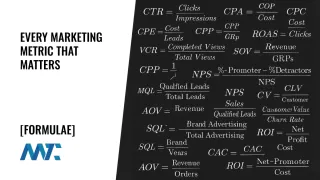If two words in this industry make me groan and walk away, it’s the phrase making money.
Marketing technology has advanced extraordinarily, giving brands unprecedented tools to target, engage, and convert customers more efficiently than ever. AI-driven analytics, hyper-personalized messaging, and automated customer journeys can guide prospects seamlessly from awareness to purchase with remarkable precision. But as marketing becomes more effective at squeezing every penny from consumers, it risks becoming a victim of its success—sacrificing long-term sustainability for short-term revenue.
I was speaking with my son about this, and he shared Goodhart’s Law, which best explains this phenomenon:
When a measure becomes a target, it ceases to be a good measure.
In marketing, this often manifests when conversion rates or revenue growth become the primary targets, leading to tactics that may inflate short-term numbers while undermining long-term brand health and customer retention. If conversions are the primary success metric, aggressive sales tactics, clickbait advertising, and high-pressure marketing strategies can drive immediate transactions—but at what cost? If customers feel manipulated, ignored post-purchase, or misled, they won’t return, and worse, they may spread negative word-of-mouth, eroding trust in the brand.
The Short-Term Trap: When Profit-Driven Marketing Fails
History is filled with examples of companies that prioritized making money over customer relationships, only to suffer the consequences.
- Newspapers: I worked in the newspaper industry when advertising revenue and profits peaked. Rather than reinvesting in journalistic integrity and reader engagement, many newspapers treated news as the filler between the ads. They continually raised ad rates, believing their monopoly on local information was unshakable. When online competition emerged, both advertisers and readers abandoned them en masse. Newspapers are now dying, losing all value in their product, which is news.
- SaaS Giants: I’ve worked with some of the largest software service providers in the industry. In their relentless drive to exceed quarterly targets, they courted clients aggressively, only to neglect them when bigger deals came along. When those clients needed new solutions, they didn’t return. Worse, when the founders of these companies launched their next ventures, they found doors closed—burned bridges do not get rebuilt easily.
These companies fell into the trap of treating short-term financial success as the ultimate goal, failing to recognize that proper business health depends on long-term customer retention, brand reputation, and sustained value creation. They optimized for the wrong metric—immediate revenue—while neglecting the broader picture of customer loyalty and market positioning.
Strategic Marketing: Finding the Right Customers, Not Just Any Customers
Marketing should be about identifying, engaging, and nurturing the right customers—not just any customer who is willing to pay. This means knowing when to walk away from deals that are not in the best interest of both parties. I frequently decline engagements in my own business when I know I’m not the right fit. This frustrates some potential clients, but I’ve learned that chasing short-term revenue can be destructive. The right clients who genuinely need and value what I offer are worth the wait.
Consider these real-world examples of companies thriving because they prioritize strategic customer alignment over immediate profit:
- A School Fundraising Company: This business has grown significantly because it carefully selects the schools it works with. They deliberately avoid selling in schools where their product could create socioeconomic conflicts among students, choosing instead to support those schools through philanthropy. Could they generate more revenue by pushing sales across all schools? Absolutely. But they know it’s not in the schools’ best interests, and in turn, not in theirs either.
- A Data Center Provider: While it could generate short-term profits by taking on small, quick-turnaround engagements, its real strength lies in serving large enterprises with complex compliance needs. Rather than chasing easy wins, they focus their marketing on businesses requiring deep expertise, ensuring long-term client retention and industry leadership.
- A Home Services Business: Competing in a crowded market of roofing and siding contractors, this family-owned company could aggressively upsell and pressure customers like many of their rivals. Instead, they focus on long-term relationships, prioritizing referrals from satisfied customers and repeat business from families they’ve served for generations.
- A Water Testing Company: Initially focused on consumer home test kits, they realized that developing compliance-tracking software for municipalities could have a much more significant impact. Rather than pushing consumer sales for immediate revenue, they pivoted toward government contracts that align with their larger mission of improving national water quality.
Goodhart’s Law and the Long-Term View: Retention Over Conversions
Goodhart’s Law warns that if conversions become the sole target, they cease to be a valuable measure of success. A business might see an immediate boost in sales through aggressive digital marketing tactics, retargeting, and high-pressure sales funnels. Still, if those customers never return, the business is simply churning through leads without building sustainable growth. Retention is the true measure of a company’s marketing effectiveness, not just initial conversions.
In the examples above, success came not from making money but from making the right choices. These businesses understand that sustainable growth requires patience, discipline, and a commitment to delivering real value to the right audience.
Any marketer can help a company make money. But great marketers help businesses thrive by finding, engaging, and retaining customers who genuinely need and appreciate their products and services. Over the past decade, I’ve discovered that revenue naturally follows when you focus on serving the right clients, not chasing transactions. The role of marketing isn’t to extract wealth from customers; it’s to cultivate lasting partnerships that drive mutual success.
So, consider the long-term implications the next time someone praises a marketing campaign simply because it will make a ton of money. Will it build brand trust? Will it enhance customer loyalty? Will it position the business for sustainable success? If the answer is no, the short-term gain is not worth the long-term cost.
